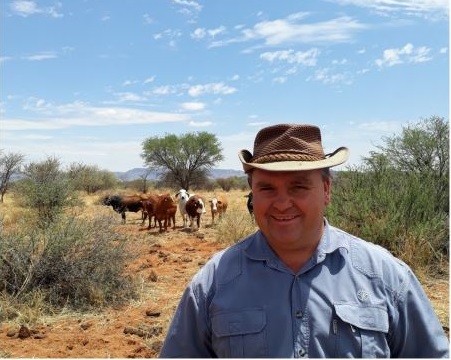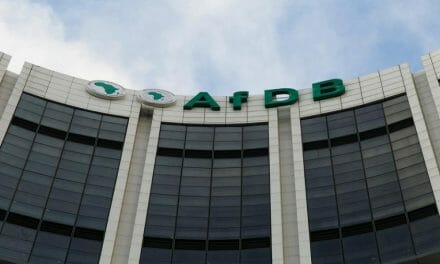
A man for all seasons now also a leader of farmers

The Executive Manager designate of the Namibia Agricultural Union, Mr Roelie Venter harbours lofty aspirations for agriculture as an economic sector. Emphasising the union’s relevance for its members and stakeholders, he is of the opinion that agriculture can only grow and be vibrant if the building blocks, the farmers and producers, are profitable and sustainable, each in his own type of farming operation and each on his own tenured land.
Not only is Roelie Venter an accomplished administrator, he is emphatically connected to farming as part-time farmer in the Gobabis district. This puts him in a position where he understands both the challenges of farming at production level and the economic demands on the sector at national level.
Speaking to the Economist, he reiterated the basic principle that a financially independent producer is a sine qua non for the future of agriculture as a whole. For this reason, he sees the agricultural union’s primary role as that of a representative for its members, the farmers of Namibia.
Earlier in October, the union’s Executive Council announced that Mr Venter will succeed Mr Sakkie Coetzee who retires at the end of November, as Executive Manager. In his current position, Mr Venter is the National Coordinator for the implementation of the Namibia Rangeland Management Policy and Strategy.
“My first consideration is to ensure that the Namibia Agricultural Union remains relevant for its members. They support the union with their membership fees through the farmers associations of which there are more than 70 in Namibia” said Mr Venter, explaining the close relationship in commercial agriculture between the producers, the district-based farmers associations and the umbrella organisation, the union which functions at national level.
During the interview, the discussion repeatedly returns to profitability and sustainability. This encapsulates his second goal for the union. “As an agricultural union we support our members with information, technical assistance, management skills and marketing. We need to ensure that every farmer is financially strong. The sustainability of the individual producer as well as that of the sector, will guarantee a strong future for agriculture,” he said.
His third goal relates to all farmers be they commercial or communal. “I see a positive future based on unity and solidarity. This starts with cooperation between the three agricultural unions, closer links with the Ministry of Agriculture, and a broadly defined coordinating role in providing technical assistance.”
He is passionate about the role of an agricultural union saying it is the primary empowerment vehicle for its members. As an example he cited the coordinated implementation of the Cabinet-endorsed National Rangeland Management policy. “All three unions, the Namibia Agricultural Union (NAU), the Namibia National Farmers Union (NNFU), and the Namibia Emerging Commercial Farmers Union (NECFU) worked together on the implementation of this policy. “When we focus on the mutually beneficial issues like rangeland management, livestock management and production, then we are taking the first steps to a unified agriculture sector,” he said.
Explaining the dynamics of cooperation, his vision of organised agriculture is based on three strong unions, each promoting the interests of its members. “Each union must be strengthened in its own right. Cooperation between three strong unions is more effective as we clearly demonstrated with the Rangeland Management project.”
In his opinion, this also holds the key to effective land reform. “Successful land reform depends on whether emerging farmers will be financially successful in a sustainable manner. The NAU is therefore supporting the other unions for they in turn contribute to make their members strong and successful as agricultural producers. Their support is also a strong voice to convince the ministry to allocate a much bigger portion of its budget to support emerging farmers. At this point, by far the majority of the ministry’s budget to build farmers’ capacity goes to communal farmers leaving emerging commercial farmers behind. It is only through NECFU that they have a voice but they are at a disadvantage when it comes to technical support and financing.”
Marketing and Market Interference
“For every 1000 less sheep marketed in a year, about three permanent jobs are lost on commercial farms as sheep production is more labour intensive than cattle or game farming” said Mr Venter to underscore his strong views on market interference and distortions. “Due to a regulated market where one sheep must be slaughtered locally in order to export one head live, sheep production has declined from around 1.1 million animals per year during the period 2003 to 2007 to an estimated 700,000 units for this year. Not only has permanent jobs been destroyed through this policy, promoting local smallstock abattoirs costs more than the local value added meaning we are in a negative net position. When this happens, the sustainability of the producer is affected as can be seen in the drastic reduction in smallstock marketing. This in turn impacts the local abattoirs with the result that two have already shut down. The closed border policy has harmed producers, it has harmed farmworkers and now it has harmed both the abattoir employees and the shareholders. Nothing has been gained.”
“I see a similar trend starting to emerge with cattle,” he continued. “Namibia produces roughly 400,000 units a year. Meatco used to slaughter around 160,000 animals during the five years post Independence, with the rest exported live as weaners to South African feedlots. That figure has remained more or less the same. If you measure it by kilogram, about 68% was slaughtered locally from 1990 to 1994. Over the last five years it is still 66% indicating that the split between live exports and local slaughter has changed very little. It is however the local market dynamics that have shifted significantly. Meatco’s share has come down dramatically to an expected 80,000 units while independent, small abattoirs that slaughter for the local market, have become dominant. This shows that the domestic market has become an important player and that the bulk of the market for red meat producers consists of a combination of live exports and local slaughter.”
“If we close the border for weaner exports, we are harming thousands of communal farmers south of the veterinary cordon fence. About 60% of the weaners marketed comes from communal areas and this is a major source of revenue for these farmers. Close the border and you interfere with the market, again as has been convincingly shown when weaner prices declined steeply.”
Dwelling on his views on price, Mr Venter said producers are pricetakers and that they have little control over what their animals fetch in an open market. But then the “prices must be fair and they must be based on competitive bidding. Any form of interference distorts the market and the producer is penalised. This holds major financial implications for the farmer. There is also a significant negative multiplier effect. When farmers do not get realistic prices, they stop marketing and they stop their procurement. This has an immediate negative effect on the businesses in the towns, leading to retrenchments, reduced employment, less turnover for the retailers and less income for the town as a whole.”
Unlocking the Potential of the Northern Communal Areas
His views on red meat production from the Northern Communal Areas (NCA) are also clear and precise. “Everything depends on a reliable veterinary cordon fence on the border between Namibia and Angola,” he said. “If Foot and Mouth disease breaks out in the Congo, then it affects the entire Angola as well as Namibia’s northern communal areas. No fence between Namibia and Angola means no elevation in the veterinary status of the animals from the NCA. And after the fence has been erected, the veterinary status of an area does not change overnight. It happens in phases according to regulations of the Directorate of Veterinary Services, before the NCA reach full FMD-free status.”
Pointing out that there are more attractive opportunities for local production, Mr Venter said there are roughly 1.2 million cattle in the northern communal areas excluding Zambezi and about 1.2 million people. “There is therefore already a significant market in the North yet informal butchers still buy their slaughter animals south of the veterinary cordon fence and take them live to the North and slaughter them there for the local market. This shows there is substantial demand but then the quality of the local commodity must be improved. In this regard, the role of the NNFU is critical to change NCA producers’ perceptions to improve the quality and marketability of their animals. Upgrading of the product is essential if the NCA producers want to tap into their proven local market,” he said.
Resumè
Roelie Venter is a graduate of the University of the Orange Free State in South Africa with a BSc Agric (Hons). He has also read a Masters in Business Leadership at Unisa.











































